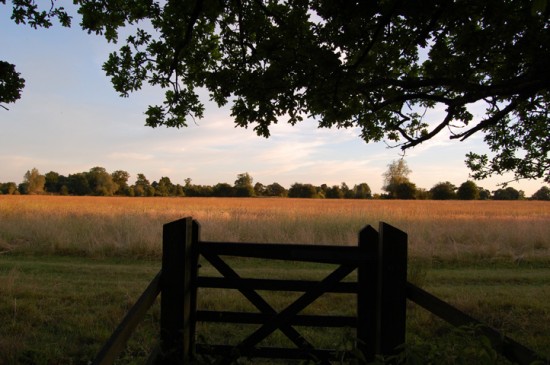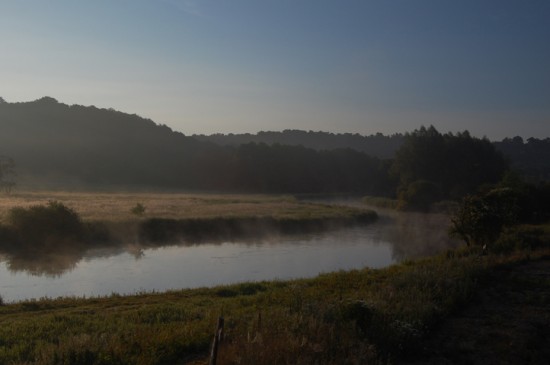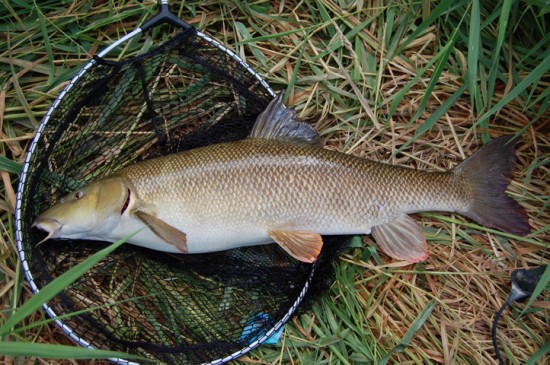
by Danny Adcock.
For the last five years I’ve stayed on a farm in Hampshire and fished the river Avon for the first week of the coarse fishing season. Unfortunately this year I couldn’t make it, and so I wrote this, about the walk from the cottage to the river at dawn, to remind me of what I’m missing.
I step out into the cool, damp morning air, and close the door of the cottage quietly behind me. Above, stars prick the deep ocean-blue of the sky, and there’s an urgent expectancy to my movements because I know the dawn is coming.
The rod is leaning against the fence still tackled up from the evening before. My bag’s already on my back, and now I sling my chair over one shoulder, pick up the rod, and head out through the gate. In the farmyard I pass the big, dark, resting shape of a tractor. I know that soon the farm and the tractor will rattle into life, and the haymaking will start, but for now there’s only me. As I leave the farmyard I pass the closed doors of the barn where yesterday evening the barn owl chicks were hissing from the rafters.
Every June for the last five years I’ve stayed here, and the walk from the cottage to the river holds such symbolism for me: the silence, the anticipation, and at its end the clear and quiet flow of the river. Even though I live more than a hundred miles away I feel I know this place as well as any other. Before I came here for the first time I’d dreamt about it; not this specific place, but one just like it. In fact one so like it it’s almost as if I had been here before.
The landowners know every inch of their beloved farm. It was they who told me about the shoal of perch under the bridge that crosses the carrier downstream; about the hobby that skims the water meadows taking the cream of the dragon and damselflies; about the otters I’ve glimpsed in the trout stream that runs parallel with the river.
I’ve left the farm behind me now, and opening and closing a gate, begin to walk alongside the trout stream, and down through the hay meadows. The deep blue of the sky is lightening all the time, and the morning mist is lilting gently from the water. Something in the hay is startled and I hear the drumming of what I imagine is a roe deer’s hooves across the hard ground baked by the heat of the sun, and the lack of rain.
I’m halfway down the top hay meadow and through the gloom can see the next gate. The bag and the weight of the chair are cutting into my shoulders but I hardly notice as I unlatch the gate and step onto the rather unsteady bridge which crosses the trout stream. Trees crowd the path. I point the rod tip ahead and twist along through the waist high nettles and swear as the chair catches on a branch, swings back, and raps me on the kneecap. I emerge on the other side of the stream and the trees, and for the first time I see the river.
The mist that was coming off the trout stream is thicker now I’m through the trees. It rises from the river like it did the trout stream cloaking it and the water meadows that line both banks. Beyond the meadows, above the mist, the ground begins to rise and greets the close packed trees of the New Forest. Now they’re indistinct, but in an hour or so they’ll be clearer, and I’m reminded of the coming sun and press on through the long grass. I’m grateful for the waterproof trousers and boots I have on because the grass is soaked with dew, and waist high. I’m getting excited now; soon I’ll reach the swim I intend to fish. The likelihood of it being occupied is close to zero; there are a couple of other fishermen staying at the farm, but knowing them as I do – they’ve also been coming here for the last few years – I know they wouldn’t be fishing in a swim which I’d been feeding for a couple of days.

I reach the place I left at dusk yesterday. It’s exactly as it was. The nettles are flattened down, but between me and the river the reeds are still standing. Once I get set up I’ll be below the level of the reeds and completely invisible from the river. I’ve seen others fishing here who’ve methodically cleared the bank-side vegetation; seen them stand upright though I’ve carefully approached behind them; heard them mutter about how difficult the fishing is here and have wanted to say what do you expect? Instead I’ve sympathised, said good luck, and moved downstream to my own swim.
Now, well back from the bank, I breathe a sigh of relief as I ease the chair and bag from my shoulders. Out of the bag I take a tub of hempseed. I put plenty of feed into this swim last night, so I don’t want to overdo it this morning, and I especially don’t want to dump a load of feed onto the heads of feeding fish. So I take a small catapult and flick just a few loads of hemp about ten feet upstream. I know the current should bring them down to where I intend to put the hook-bait. I won’t cast yet though; instead I get the flask and cup out of the bag, find the tea bags, and pour the steaming water onto one of them. The sun’s nearly here; beyond the forest it’s rising and the sky is a clearer, lighter blue with a deep pink blush spreading over the forest.
I’ve finished the tea; twenty minutes have passed since I settled into the chair, and now I pick my rod up, take the hook from its keeper ring, and put on a lump of luncheon meat. I rise as best I can without showing myself over the reeds. I know exactly what the river’s like in front of me: how thick the ranunculus is about ten feet from the bank, but how inviting the gravel is just below the rod tip, and how the bottom shallows up slightly, gathering the hempseed on the gentle slope. Yesterday I watched the barbel move restlessly over the gravel below. I saw how they work their way up the swim and then sweep out and downstream with the current like birds on the wind; then gradually work their way up again.
Now I click the check off the centrepin and lift the bait over the reeds. Gently I lower it to meet the water, and then release the line. I know, even without seeing, that the current has pulled it a few feet downstream, but that the weight has dropped it onto just the right spot: exactly on the sloping gravel patch. I know because yesterday afternoon, before the fish appeared out of the weeds, I practiced the cast several times knowing that this morning my best chance would be my first cast. I click the check back on, and put the rod back down. I feel more at ease in this place, at this time, than I have ever felt before. I begin to notice things about me in detail: the electric blue of the damselflies resting on the reeds, wings folded, waiting for the warmth of the sun; the warblers beginning to flit manically from reed stem to reed stem, their chatter as constant as the river before me.

Though I’m relaxed when the rod tip shivers, almost imperceptibly, my hand is on the rod butt instantly. I don’t strike though, but wait. Then the rod tip is pulled a couple of inches down, and springs back. I start, and the rod tip again bounces a couple of inches. This time I know my hand jarred the rod, and so I rest it back on my thigh and tell myself to calm down.
I take the tobacco, papers and filters out of my pocket and roll a cigarette. As I breathe out the smoke it joins the mist and is pulled downstream. I notice the mist is beginning to look thinner now, and the sun is suddenly here: a burning red-gold over the trees of the forest opposite. In an hour or so I’ll be able to feel its heat, but for now the air still has that early morning chill to it. As I raise my hand to block the glare and look across the water meadows the rod tip is wrenched round without warning and I have to grab the rod to stop it disappearing into the river. The rod is bent into that most pleasing of shapes, my thumb’s on the drum of the centrepin and there’s line flying from it. I smile to myself as ten yards downstream there’s a splash and swirl on the surface, and a quick glimpse of gold in the sun and a familiar looking dorsal fin.